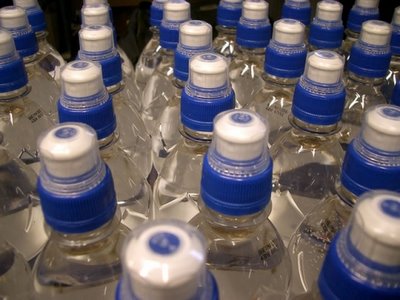
Look out!
Beware!
Lock your doors!
Take the children inside!
The hordes are at the gate of the Big Water fortress!
There's an assault on your freedom out there; your freedom to choose potentially polluted water in a polluting bottle over regulated, clean, cheap tap water.
Don't let them do it!
Such is the nature of advocacy.
And such was the tone of the press release the Thin Green Line's corporate mega-campus received recently from the Competitive Enterprise Institute.
It was titled "Campaign Targets Unfair Political Assault on Bottled Water."
In it, we're told that: "The campaign comes in the wake of a politically-motivated attack against bottled water, a study by an environmental pressure group (I love that phrase. Nice touch) designed to undermine confidence in the safety of the product.
Actually, it was designed to inform those consumers the CEI says it represents about the contents of a product, contents Big Water refuses to list.
Ask yourself this question, what does this "pressure group" have to gain by releasing this information, versus what does the bottled water lobby have to lose? As we learned in "All the President's Men," always follow the money and you'll get your answer.
“Just last week, the Environmental Working Group issued a junk science ‘study’ (don't you love how to cast doubt on something, you just have to put it in quotation marks?) suggesting bottled water contains dangerous substances and is no better than tap,” said Angela Logomasini, Ph.D., Director of Risk and Environmental Policy at CEI.
She's right. Bottled water is worse.
In it, we noted that tests of bottled water by the group, which by the way is independent and not paid by industry to reach industry-friendly conclusions, discovered an average of eight contaminants in several brands of bottled water. Four brands besides Wal-Mart's also were contaminated with bacteria.
"Our study was a snapshot of the marketplace. We found some brands that provided good quality and other brands that contained various chemical pollutants. What this shows is that consumers cannot have confidence. They don't know what they're getting," said a group spokeswoman. The group also singled out Giant Supermarket's Acadia brand for excessive levels of disinfection byproducts.
"Also present in bottled water were caffeine and the pharmaceutical Tylenol, as well as arsenic, radioactive isotopes, nitrates and ammonia from fertilizer residue. Industrial chemicals used as solvents, degreasing agents and propellants were also found in the tests," according to the newspaper we cited in the previous posting.
The study also found trace amounts of synthetic chemicals or degradation products from the manufacture of PET, or polyethylene terephthalate, including acetaldehyde, isobutane and toluene.
Sounds delicious. We should be free to ignorantly ingest those goodies should we? Isn't that what America is all about?
Ticked off that anyone they're not paying would have the temerity to test their client's product, the Competitive Enterprise Institute ginned up a little fear, a little hysteria and insisted that their right to poison you without being regulated like public water systems was tantamount to taking away your freedom of choice as consumers. Informed choice, it seems, is not something consumers are supposed to want.
“An easily accessible, calorie-free option for hydration is critical for an on-the-go society, particularly for individuals with special needs, such as the elderly, individuals engaged in sports, individuals participating in outdoor events, and individuals on the road,” read the breathless release.
So let me get this right. We want to be sure the elderly, whose immune systems are more likely to be weakened, get as much contaminated water as possible?
Might it not also be critical for this on-the-go society to know if the "calorie-free option for hydration" also happens to be increasing its risk for cancer, which would definitely put a crimp in that peppy "on the go" lifestyle of ours?
"Chicago imposed a bottled water tax, and several cities have banned bottled water in government buildings," CEI said in its shocked release.
Might that be because its a waste of money to pay 16 times the cost of regulated, safe public water for something that comes in a product created from petroleum, can leach chemicals into the contents and that lasts for centuries in a landfill?
“This is just another example of government regulators eroding our freedom,” said the release. “If they succeed in banning and taxing water, what will they go after next?”
Who knows, those nut jobs might next try making our food safer, taking away our freedom to choose contaminated meat!
That's anti-American! Trying to protect citizens. What is this Russia?
Labels: Competitive Enterprise Institute, Environmental Working Group

 RSS
RSS




